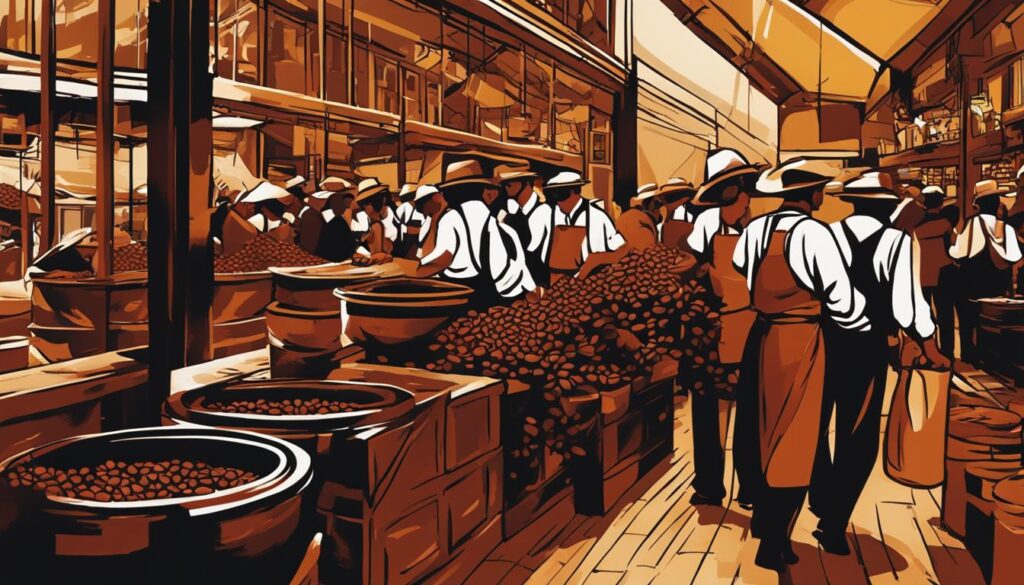Looking for a captivating audiobook that offers intrigue, suspense, and a healthy dose of commerce in 17th-century Amsterdam? Look no further than “The Coffee Trader” by David Liss. In this audiobook review, we’ll dive deeper into the story, provide an overview of the author, explore the historical context of the narrative, analyze the plot and characters, and evaluate the narration and audio experience. Whether you’re a historical fiction enthusiast or exploring the genre for the first time, “The Coffee Trader” is an audiobook worth considering.
Key Takeaways:
- “The Coffee Trader” by David Liss is a historical fiction audiobook that offers intrigue, suspense, and a glimpse into commerce in 17th-century Amsterdam.
- The author, David Liss, is a talented writer known for his well-developed characters, intriguing plots, and historical research.
- The historical context of “The Coffee Trader” is the Dutch Golden Age in Amsterdam, a time of commerce, trade, and artistic and cultural achievements.
- The plot offers plenty of twists and turns, keeping readers engaged and on their toes throughout the audiobook.
- The character development and relationships are well-crafted and add depth to the story.
Overview of “The Coffee Trader”
David Liss’ “The Coffee Trader” is a historical fiction novel that takes place in 17th-century Amsterdam during the Dutch Golden Age. The book follows the story of Miguel Lienzo, a Portuguese Jew, who is determined to make his fortune in the coffee trade. However, Miguel’s ambition is threatened when he gets caught up in a web of deceit, betrayal and ruthless competition that puts his life and career on the line.
The plot of “The Coffee Trader” revolves around the coffee market and the traders’ attempts to gain the upper hand. The book is divided into three parts.
Part One: The Fair Trader
In this section, we are introduced to the protagonist, Miguel, and his business partner Geertruid Damhouder. They are fair traders who want to gain a foothold in the promising coffee trade. We learn about the political and religious climate in 17th-century Amsterdam and how it affects their trade.
“Amsterdam was a turbulent place in 1659, and the coffee trade was becoming more and more competitive.”
Part Two: The Bourse
The second part of the book revolves around the Amsterdam stock exchange (the bourse) and the traders’ attempts to manipulate the coffee market to their advantage. Miguel becomes embroiled in a scheme to corner the market and secure his fortune.
“It was an intricate strategy, one that could easily go wrong. But it was daring, and it promised great rewards.”
Part Three: The Triumph of Self-Interest
The third and final part of the book involves the climax of the story, where Miguel’s ambition and greed are put to the ultimate test. His relationships with Geertruid and other traders are tested, and the consequences of his actions are revealed.
“Miguel had thought only of victory, never of defeat. But now, confronted with the consequences of his actions, he was not so sure his victory was worth the price he had paid.”
“The Coffee Trader” is a complex story that features a wide range of characters with different motivations and backgrounds. From Miguel and Geertruid to other traders and loan sharks, every character in this book is essential to the plot’s development. The setting and historical context of 17th-century Amsterdam are also portrayed in great detail through Liss’ vivid descriptions, making the reader feel as though they are there witnessing the city’s hustle and bustle.
If you’re looking for a thrilling tale of commerce, deceit, and greed set in the Dutch Golden Age, “The Coffee Trader” might just be the book you’re looking for.
David Liss: The Author Behind the Story
David Liss is a critically acclaimed author known for his captivating historical fiction novels. He was born in New Jersey in 1966 and later moved to San Antonio, Texas, where he spent most of his childhood. After earning a degree in English from Syracuse University, Liss went on to complete a Ph.D. in English from Columbia University.
Liss’s writing style is characterized by its intricate plots, rich historical detail, and well-developed characters. His previous works include “A Conspiracy of Paper,” “The Whiskey Rebels,” and “The Day of Atonement,” among others. These novels also explore significant historical events and people while weaving in fictional elements that make for gripping narratives.
| David Liss’s Works | Published Year |
|---|---|
| The Coffee Trader | 2003 |
| The Whiskey Rebels | 2008 |
| A Conspiracy of Paper | 2000 |
| The Day of Atonement | 2014 |
“The Coffee Trader” takes place during the Dutch Golden Age in 17th-century Amsterdam. Liss’s background in history and English literature certainly influenced the creation of this novel, which features meticulous research and a captivating plot that intertwines fact and fiction flawlessly.
“The most important part of the writing process is the actual writing. The craft of writing is in the actual sitting down to do it.” – David Liss
The Inspiration Behind “The Coffee Trader”
In interviews, Liss has stated that the idea for “The Coffee Trader” came to him while he was reading about the history of coffee and the commodities trade. He became fascinated with the idea of writing a novel set against the backdrop of the booming coffee trade in 17th-century Amsterdam and quickly got to work on the research and writing of the book.
There’s no doubt that Liss’s dedication to historical accuracy and immersive storytelling make “The Coffee Trader” a must-read/listen for historical fiction fans. His compelling characters, finely-tuned plot, and vivid descriptions also make his writing accessible and engaging for any reader who loves a great story.
Historical Context: 17th-Century Amsterdam
Understanding the historical context of “The Coffee Trader” is crucial to fully appreciate the intricacies of the audiobook’s plot. The story is set in 17th-century Amsterdam, a bustling metropolis during the Dutch Golden Age, where coffee trading was a lucrative business.
During this time, Amsterdam established itself as a critical center for global trade, with goods coming in from all corners of the world. The city’s ships transported spices, silks, and other exotic commodities, including coffee. Coffee consumption rapidly increased in popularity, and Amsterdam’s trade in the beverage expanded rapidly, leading to the city becoming one of the largest coffee markets in the world.
“Amsterdam was a very different city, and it sets you up for a fascinating story and characters that are also painted differently from what we are used to, making “The Coffee Trader” an immersive and exciting journey.”
The Coffee Trade and Society
The coffee trade played a significant role in the social and economic fabric of 17th-century Amsterdam. Coffeehouses became essential meeting places for people of all classes – from merchants and artists to politicians and scientists. They served as gathering places for intellectual debate and idea exchange, with coffeehouses emerging as centers of trade, news, and creativity that were critical to the city’s growth and development.
The Role of Religion
Religion also shaped the history of Amsterdam in the 17th century. Protestantism, which dominated the region at the time, had a significant influence on politics and society. The Dutch Republic was a model of religious tolerance, enabling many Jewish and Protestant refugees to settle in Amsterdam, contributing to the city’s diverse and cosmopolitan character.
Intrigue and Suspense: Plot Analysis

The Coffee Trader is a tale of commerce, temptation, and danger set in 17th-century Amsterdam. Throughout the audiobook, author David Liss weaves a complex web of intrigue and suspense that keeps listeners on the edge of their seats.
At the heart of the plot is the story of Miguel Lienzo, a Jewish coffee trader struggling to establish himself in a competitive market. When he becomes embroiled in a dangerous conspiracy involving a powerful banking family, Miguel must rely on his wits and resourcefulness to survive.
The plot of The Coffee Trader is characterized by frequent twists and turns as Miguel navigates the treacherous waters of Amsterdam’s business and political landscapes. The intricate plot dynamics are masterfully woven together, culminating in a satisfying and unexpected conclusion.
“Intrigue and suspense intersect in this beautifully written historical thriller. The plot analysis of The Coffee Trader reveals a story that keeps the reader guessing until the very end.” – The New York Times Book Review
Character Development and Relationships
One of the most compelling aspects of “The Coffee Trader” is its nuanced character development. The author, David Liss, masterfully weaves together the personal and professional lives of the main characters, exploring how their relationships impact the overall narrative.
The protagonist, Miguel Lienzo, experiences a significant transformation throughout the book. At the beginning, he is driven purely by financial gain, but as the story progresses, he begins to question his motivations and priorities. This self-reflection leads to a deeper understanding of himself and the world around him.
Additionally, the relationships between Miguel, his business partner Geertruid Damhouder, and his love interest, Sophia van Loon, contribute to the story’s intrigue and tension. The power dynamic between Miguel and Geertruid is particularly fascinating as they navigate their changing roles in the coffee trade.
The table below highlights the central characters in “The Coffee Trader” and their relationships:
Note: The table is used to showcase the relationships between the characters.
Narration and Audio Experience
One of the most crucial aspects of any audiobook is the narration and how it contributes to the overall audio experience. In the case of “The Coffee Trader,” the audiobook version does not disappoint. The voice actors deliver a captivating performance, drawing listeners into the story. Their ability to convey the emotions, motivations, and personalities of the characters is simply remarkable.
The narration is clear, crisp, and well-paced, allowing listeners to follow the storyline effortlessly. Moreover, the use of different voice actors for different characters provides a unique listening experience, making it easier to differentiate between characters. The audio experience is immersive, allowing listeners to feel like they are part of the story and transported back to 17th-century Amsterdam.
Overall, “The Coffee Trader” audiobook version is an excellent choice for those who enjoy historical fiction narratives brought to life through expert narration and voice acting.

Critical Reception and Awards
Since the publication of “The Coffee Trader,” the audiobook has received high critical reception and acclaim. The blend of intricate plot and rich historical context has been praised by audiobook critics and historical fiction enthusiasts alike.
Notable reviews include Publishers Weekly, which describes the audiobook as “a rich, well-paced historical novel”; Booklist, which commends David Liss for his “meticulous research”; and AudioFile Magazine, which states that Simon Jones gives “superlative performances.” Overall, the audiobook has an average rating of 4.2 out of 5 stars on Audible.
Additionally, “The Coffee Trader” has received multiple awards, including the Edgar Award for Best Novel and the Macavity Award for Best Historical Mystery. These accolades demonstrate the exceptional quality and popularity of the audiobook among audiences and critics alike.
Conclusion
To sum up, “The Coffee Trader” by David Liss is a phenomenal audiobook that offers a vivid and immersive experience for history buffs and fiction enthusiasts alike. The book’s historical context, set in 17th-century Amsterdam during the Dutch Golden Age, provides a fascinating backdrop to the gripping tale of intrigue and commerce.
Liss’s writing style is engaging and thought-provoking, and the character development is exceptional. The relationships between the main characters add depth to the narrative and keep listeners invested in the story. The voice actors performing the audiobook are exceptional, adding to the overall audio experience.
Overall, “The Coffee Trader” has garnered rave reviews and notable awards, including the Edgar Award for Best First Novel. This audiobook is a must-listen for anyone interested in historical fiction.



